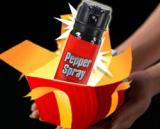Panaji, Jan 8: Even as the country debates ways to rein in sex offenders, a pharmacology research scientist here has hit the streets of Goa equipping women with a weapon to beat perverts at their own game.
Lanky Sudeep Dalvi has started a campaign in the state to sell cans of pepper spray to women at cost price. The cans, Dalvi says, will be made available at all bus stations and colleges across Goa and will be sold only to women and girls.
"It's not all about handing over pepper spray cans to women. If they cannot use it at the right time, the purpose will be defeated," Dalvi said, adding that live demonstrations would also be conducted whenever a can of pepper spray is sold.
The charged Dalvi has called this pepper spray campaign 'Operation Dusht Daman'. And Dalvi takes "vanquishing the evil" seriously. "Along with pepper spray cans, the counter will also have video screening of precautions women and girls can take to handle potential molesters," he said.
"Pepper spray is very effective. Its stun effect is such that an assaulter can be effectively put out of action for a good 20 minutes, during which his victim can slip away or call for help," he said.
"There should not be a situation where the girl should have to go through the ordeal of visiting a police station to file a complaint about rape and molestation. Instead, the offender should be sent to hospital. The pepper spray can do that," Dalvi said.
Aditi Naik studies at the Dhempe College of Arts and Science located near Panaji. She just bought the pepper spray and admitted that as a weapon, it has given her a sense of confidence. "At least I can respond effectively against some of the harassment meted to us by street romeos. I think if we use the spray once, everyone else will fall into place," Aditi said.
Pepper spray cans are normally available for over Rs.500, but at cost price, Dalvi's products are being offered for Rs.300. "It's only aim and shoot kinda spray. But we are taking down the details of every can sold so that the spray cans are not misused and do not fall in wrong hands," Dalvi said.
The pharmacology scientist said he was one of the million of Indians moved by the plight of the New Delhi gang-rape victim, but decided that something had to be done at a personal level to redeem one's conscience.
And making cheap pepper spray available to women and girls was his way of dealing with personal demons. The sprays will be available at bus stands and public areas Jan 28-30.
But Dalvi has planned another event Jan 26. He will swim across the Mandovi river to secure attention to the cause. The swim across the river, which is about a kilometre in breadth, he hopes, will help create enough buzz about Operation Dusht Daman.





Comments
Add new comment